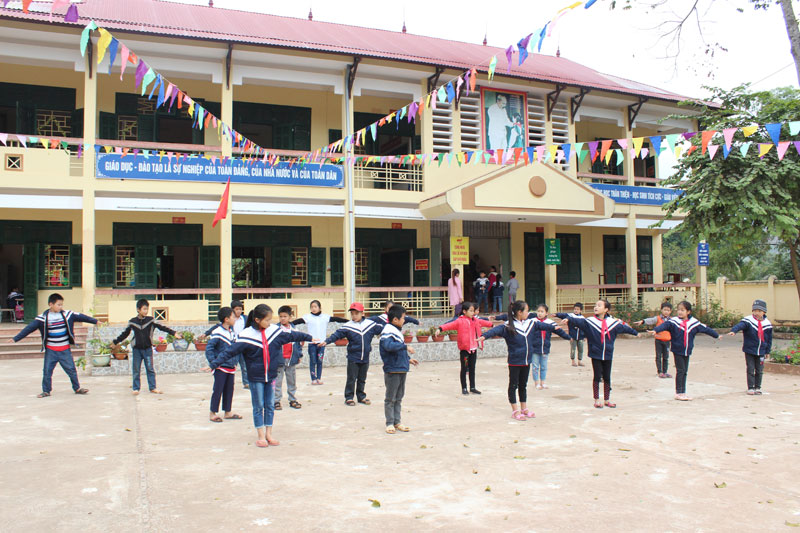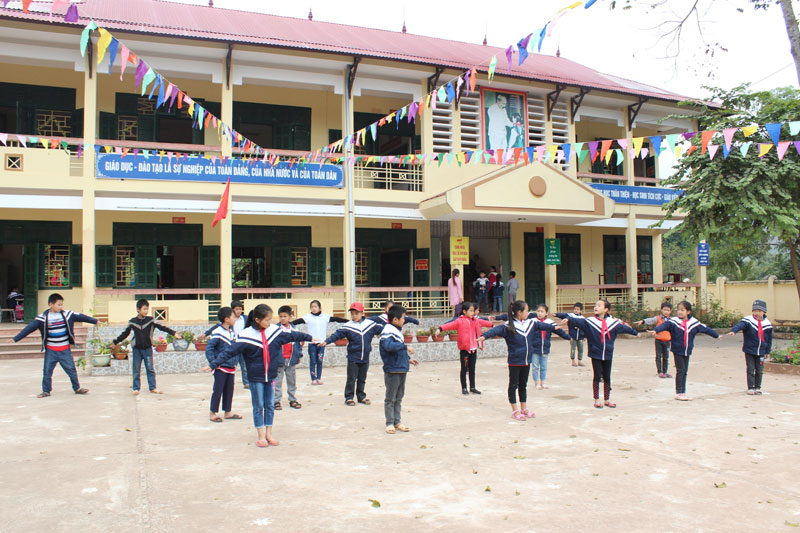



A
Physical Education lesson in Na Meo Primary School (Mai Chau), the outdoor
activities is arranged in the suitable climate to ensure the pupils’ health.
We visited Na Meo
Primary School (Na Meo commune, Mai Chau district) when the pupils started
their morning lessons. Teacher Le Thi Nga, the headmaster of the school told:
"The school has 8 classes with 114 pupils. Besides the main school in Na Meo
village, the school also has a branch in Xo village with 3 classes, 35 pupils
because Xo village is so far about 10 km from the commune center and the road
to the village is difficult to travel. In the commune area, Na Mo village and
Sam Pa village is far away about 3-4 km, so that the school has organized half-
boarding for 51 pupils. Na Meo belongs to the extremely poor area with nearly
70% of pupils are poor. Many pupils’ children work far away from home, and they
stay home with their grandparents. Therefore, the pupils have to walk to school
by themselves because they cannot be picked up by adults. Hence, the school
really takes care of ensuring the pupils’ health in the cold weather. Because
the temperature is really low in the morning, the school starts the lesson
later at 7.45 am in the morning and earlier at 13.30, finishes at 16.00 so that
the pupils can get home earlier without darkness and coldness.
Adjusting the
timetable is a solution that many schools in Mai Chau District carry out in
order to ensure the pupils’ health in the cold weather. In addition, at the
beginning of winter, the Board of Education and Training directed all the
schools to well prepare about the facilities, such as: buying more curtains,
renovating the door systems to ensure the efficient lights and air. With
boarding schools, they needed to buy more blankets, pillows and cushions for
the warm rest at noon. The kindergartens had to buy foam pieces for children to
learn or play.
Especially, for
preschool children, the health care, particularly ensuring the adequate
nutrients in the diet is taken into consideration. Teacher Ha Thi Hien of
Chieng Chau Preschool said: The children’s diets are prepared to ensure the
nutrients, add more vegetables and protein. The food and drink are kept warm;
rice is divided right at the time of dining so that it cannot be cool. Teachers
take care and ask the children to eat all the diets. The work of teaching
indoor or outdoor must be based on the weather condition.
Mai Chau has
some highland communes, such as Hang Kia, Pa Co, Tan Son, Na Meo, etc. These
communes usually have fog, especially in winter; the temperature drops so low
at night and in the early morning; some places have snow appeared. Mr. Ha Van
Cuom, the Head of the District Department of Education and Training said: Due
to the characteristics of the terrain and the weather, the prevention of cold
weather for pupils is always being focused on. In addition to the preparation
of facilities, adjusting the study timetable, organization of appropriate study
locations, etc., the Board noted to schools to follow the weather forecast
closely through the media. Since then, they can strengthen the propaganda and
reminder to parents for making their children wear warm clothes. The schools
also pay attention to implementing well the school medical care for children,
disease protection and prevention. On the cold days with low temperature,
schools in Mai Chau District still remained the attendance rate of children
going to school. All the playing and studying activities were exploited fully
so that parents could be comfortable while working. If the temperature reduced
too low, the schools would ask pupils to drop out and arrange the extra classes
in accordance with the regulations.